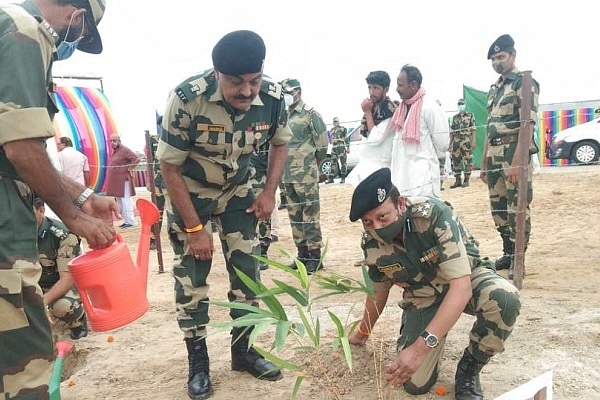News Brief
KVIC And BSF Launch Green Cover Project In Jaisalmer To Prevent Desertification
- Situated nearly 120 km from Jaisalmer city, Tanot has become one of most visited tourist spots in Rajasthan.
- KVIC plans to develop the bamboo-based green patch in Tanot as a tourist attraction.

BSF officials plant a bamboo sapling in Jaisalmer as part of anti-desertification measures.
In the first of its kind efforts to develop green cover in the Indian deserts of Rajasthan, Khadi and Village Industries Commission (KVIC) has planted 1,000 bamboo saplings at Tanot village in Jaisalmer, in collaboration with the Border Security Force (BSF).
KVIC Chairman Vinai Kumar Saxena launched the plantation programme in presence of BSF Special DG Surendra Panwar.
Bamboo plantation, as part of KVIC’s Project BOLD (Bamboo Oasis on Lands in Drought) aims at serving the combined national goals of reducing desertification and providing livelihood and multi-disciplinary rural industry support to the local population.
The bamboo saplings have been planted over 2.50 lakh sq feet of Gram Panchayat land near the famous Tanot Mata Temple which is located close to Longewala Post on the Indo-Pakistan border.
Situated nearly 120 km from Jaisalmer city, Tanot has become one of most visited tourist spots in Rajasthan. KVIC plans to develop the bamboo-based green patch in Tanot as a tourist attraction.
BSF will be responsible for maintaining the plants.
Project BOLD was launched on July 4 from a tribal village of Nichla Mandwa in Udaipur district in Rajasthan with the plantation of 5,000 saplings of special bamboo species over 25 bigha of arid land.
It is aligned with Prime Minister Narendra Modi’s call for reducing land degradation and preventing desertification in the country. The initiative has been launched as part of KVIC’s “Khadi Bamboo Festival” to celebrate 75 years of Independence.
The KVIC chairman said the bamboo plantation in the deserts of Jaisalmer will serve multiple objectives — preventing desertification, environment protection and creating a sustainable model of development by supporting rural and bamboo-based industries.
“In the next three years, these bamboos will be ready for harvest. While this will generate recurring income for the local villagers, KVIC will also develop this green patch into a tourist spot, considering the large footfall of tourists visiting Longewala post and the Tanot Mata Temple,” Saxena said.
He lauded the support of BSF in implementing the project in a very short time.
In the next three years, 1,000 bamboo plants will multiply and produce at least 4,000 bamboo logs weighing about 100 MT. At the current market rate of Rs 5,000 per ton, this bamboo produce will generate an income of nearly Rs 5 lakh after three years and later on every year, thus supporting the local economy.
Bamboo can be used for making agarbatti sticks, furniture, handicraft, musical instruments and paper pulp, while bamboo waste is widely used in making charcoal and fuel briquette.
Bamboos are also known for conserving water and hence useful in arid and drought-prone regions.
Introducing ElectionsHQ + 50 Ground Reports Project
The 2024 elections might seem easy to guess, but there are some important questions that shouldn't be missed.
Do freebies still sway voters? Do people prioritise infrastructure when voting? How will Punjab vote?
The answers to these questions provide great insights into where we, as a country, are headed in the years to come.
Swarajya is starting a project with an aim to do 50 solid ground stories and a smart commentary service on WhatsApp, a one-of-a-kind. We'd love your support during this election season.
Click below to contribute.
Latest